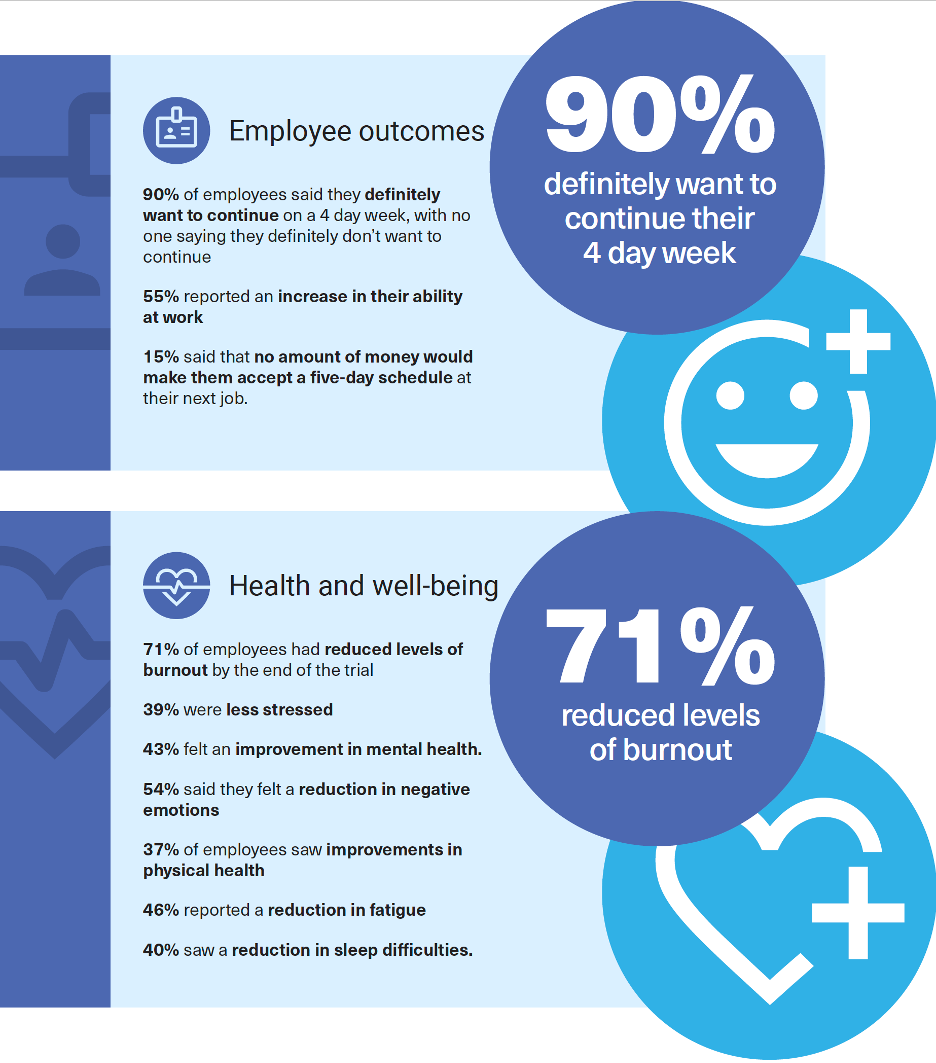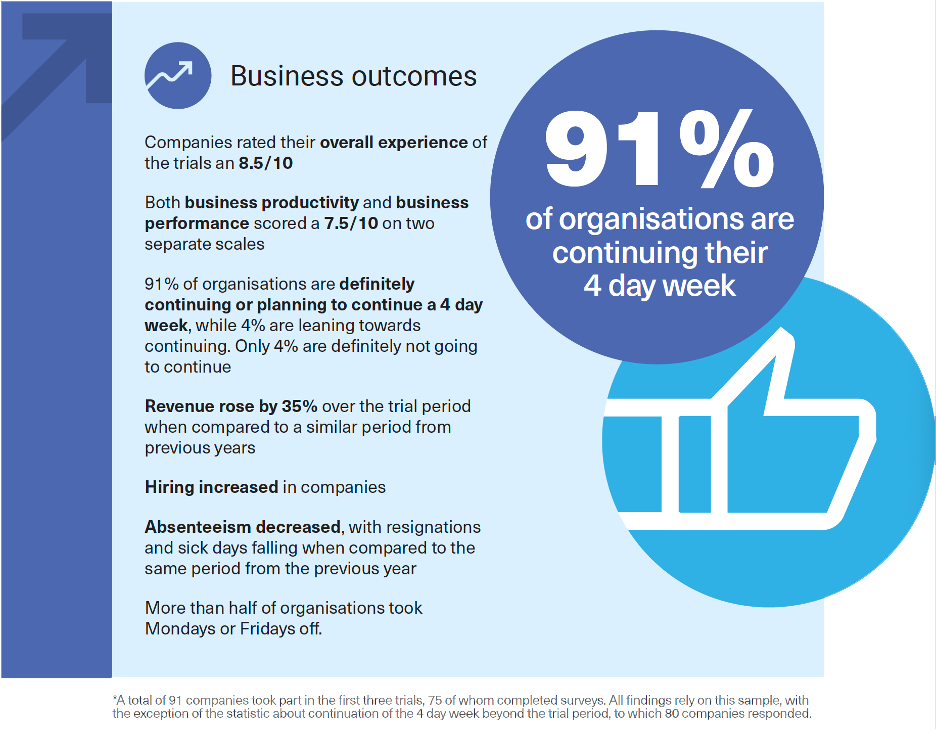Turborilla, an Alloy 26 company with roots in Sweden deploys a 4-day work week based on recent global studies (Global). Turborilla is one of Sweden's leading game studios, behind the smash hits Mad Skills Motocross and Mad Skills BMX!
Bryan Stealey, Turborila’s CMO and Head of Publishing shares about the company’s new implementation.
“There's a bit of a global trend happening where companies are finding that moving to a four-day work week is something more effective for them.”
While this may seem unfounded in a world where very few things are held with higher regard than productivity, the 4-day workweek study has paradoxically found that reducing days in the workweek did not affect output or revenue.
In 4 Day Week Global, 61 companies and about 2,900 workers geared up for the trial where they would receive “100% of the pay, for 80% of the time, in exchange for a commitment to delivering 100% of the output” (Global).
Findings showed that in addition to a number of other benefits, productivity either remained the same or improved.
Bryan Stealey says, “Crushing people to try to produce more, I'm not sure that ultimately ends up with a net gain…we think there's a smarter way to do it.”
The study recently released data from 33 companies from the first and second trials. All of which reported, “…a high level of satisfaction on the part of both employers and employees with the four-day week: Companies noted an improvement in productivity and growth in revenue; workers reported less stress and burnout, and an overall positive effect on mental and physical health” (Boston College, 2022).
Bryan’s company, Turborilla is currently testing out the 4-day workweek model. After their 6-month trial, Turborilla will determine whether to continue. “We’re going to look and see how this works from an employee retainment standpoint and from a recruiting standpoint. We have some metrics in place that the producers are following to measure productivity. And we expect that productivity will remain where it is,” Bryan says.
PROS AND CONS
Like with anything else, there are pros and cons to the 4-day workweek. “Having Friday off every week is unreal. It's great. You think about how you feel when you have Memorial Day weekend. That's me every weekend,” says Stealey.
The 4-day work week is making people rethink the way they work. It becomes all about prioritization. With a time difference between Turborilla’s Alloy 26 office here in Pittsburgh and the rest of Turborilla’s team in Sweden, Bryan only has 2 hours per day to work directly with that part of his team. This used the be 5 days/week, resulting in 10 hours working with his Swedish counterparts. Now he is down to 8.
“An attempt to work smarter and not harder is a pretty liberating thing,” Bryan says. “And also probably something more people should do, whether they're moving to a four-day work week or not.”
Bryan reports feeling fully recharged after every weekend. Like most people, Bryan feels better at the end of the day when he knows he’s been productive, and being charged up helps; however, without the 5th work day, Bryan notes that there is not as much downtime during the day and that he now has to keep all his errands to Fridays because he can’t afford any more time off during the week.
“Now that I've moved to a four-day work week, I don't feel a ton of flexibility on a day-to-day basis,” Bryan says.
Getting sick is a bigger deal too. “Before a sick day took out 20% of your work week. Now sick day takes out 25%.”
Conveniently, when a 4-day workweek is implemented, sicknesses become far less common.
Employees reported fewer feelings of stress and burnout, and the number of sick and personal days taken was reduced. “Employees across industries reported decreased feelings of anxiety, fatigue, poor sleep, and increased physical health. Seventy-one percent of the employees reported feeling lower levels of burnout, and 39% reported lower levels of stress compared to the beginning of the four-day workweek trial. Overall, sick and personal days taken decreased by 65%” (https://fortune.com/well/2023/02/20/4-day-work-week-less-burnout-fewer-sick-days/).
There are several concrete benefits for employers as well including, …” lower employee health care costs, less employee turnover, and an asset for recruiting new workers” (Boston College, 2022).
These results were consistent across various subgroups within the sample (men and women, small companies and bigger, and generally across industries.) Across subgroups, workers reported, “…feeling heard, being able to work effectively and competently, and relating well toco-workers” (4dayWWStudy.pdf).
Employee satisfaction for both work and life increased. They had fewer sleeping problems. They were exercising more. They had better overall physical and mental health. Turborilla plans to prove this out for themselves as well.
“We really care about the health and well-being of our employees,” Bryan says, “And we think that conceptually just makes sense that if you feel better, you're probably going to work better too.”
When employees are given an extra day back for them to do whatever is important to them, they will feel inclined to do what’s important for their employer when they’re working because of a mutual feeling of respect that’s been created.
Symbiotic relationships are important for sustainable work/life satisfaction, productivity, and overall mental and physical health. It just makes sense.
Are you more likely to help out the friend that’s always been there to help you? Or the one that only asks for favors?
“To me, people feeling included, counted in what they do, make a difference in what we do,” says Bryan. “It builds a culture that makes the company way stronger and gives you less turnover and better people feel better at work and then people feel better, produce more and stay more energetic.”





.png)
.png)
.png)





